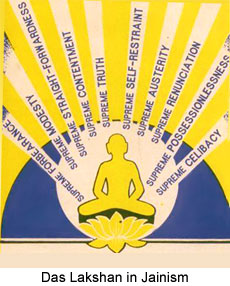 Daslakshan Parva is the Festival of ten virtues. It is the Paryusana Parva celebrated by the Digambara Jains every year for self-purification and uplift. The festival is celebrated for ten days. According to the Jains this parva helps in purifying the soul and ultimately leads to salvation or nirvana. The festival is related to the observance of ten universal virtues; viz., forgiveness, contentment, and celibacy, which aim at the uplift of the soul and are vividly preached and practiced during the festival. The ten virtues or dharma are: `Dharma, Seva, Kshanti, Mridutvmrijuta, ch Shotmath, Satyam Akinchanyam, Brahm, tyagshch, tapashch, sanyamshcheti`
Daslakshan Parva is the Festival of ten virtues. It is the Paryusana Parva celebrated by the Digambara Jains every year for self-purification and uplift. The festival is celebrated for ten days. According to the Jains this parva helps in purifying the soul and ultimately leads to salvation or nirvana. The festival is related to the observance of ten universal virtues; viz., forgiveness, contentment, and celibacy, which aim at the uplift of the soul and are vividly preached and practiced during the festival. The ten virtues or dharma are: `Dharma, Seva, Kshanti, Mridutvmrijuta, ch Shotmath, Satyam Akinchanyam, Brahm, tyagshch, tapashch, sanyamshcheti`
The ten virtues or dharma are explained below:
1. Uttama Kshama - Supreme Forgiveness (To observe tolerance whole-heartedly, shunning anger.)
2. Mardava - Tenderness or Humility (To observe the virtue of humility subduing vanity and passions.)
3. Arjaya - Straight-forwardness or Honesty (To practice a deceit-free conduct in life by vanquishing the passion of deception.)
4. Shaucha - Contentment or Purity (To keep the body, mind and speech pure by discarding greed.
5. Satya - Truthfulness (To speak affectionate and just words with a holy intention causing no injury to any living being.)
6. Sanyam - Self-restraint (To defend all living beings with utmost power in a cosmopolitan spirit abstaining from all the pleasures provided by the five senses - touch, taste, smell, sight, and hearing; and the sixth - mind.)
7. Tapa - Penance or Austerities (To practice austerities putting a check on all worldly allurements.)
8. Tyaga - Renunciation (To give four fold charities - Ahara (food), Abhaya (fearlessness), Aushadha (medicine), and Shastra Dana (distribution of Holy Scriptures), and to patronize social and religious institutions for self and other uplifts.)
9. Akinchanya - Non-attachment (To enhance faith in the real self as against non-self i.e., material objects; and to discard internal Parigraha viz. anger and pride; and external Parigraha viz. accumulation of gold, diamonds, and royal treasures.)
10. Brahmacarya - Chastity or celibacy (To observe the great vow of celibacy; to have devotion for the inner soul and the omniscient Lord; to discard the carnal desires, vulgar fashions, child and old-age marriages, dowry dominated marriages, polygamy, criminal assault on ladies, use of foul and vulgar language.)
Observance of Das Lakshan Parva
Das Lakshan Parva is celebrated for ten days where the Dashlakshan Dharma is celebrated. The eleventh day is the day of Kashma Yachna. This festival reminds of the characteristics of the soul. During the Paryushan festival the Jains practice penances, vows, fast and study. It they are not fasting they refrain from eating root vegetables. Festivals are of two categories: eternal and non-eternal. Non-eternal festivals have been further divided, one that relates to people and those that relate to historical events. Festivals like Diwali, Mahavir Jayanti, are people related festivals that celebrate the liberation and birth of Lord Mahavira.
Das Lakshan Parva is an eternal festival. It does not relate to people or to any historical event. This festival celebrates the natural qualities of the soul. The festival falls three times a year but is only celebrated once around the month of August/September because it is the time of monsoon retreat when insects flourish, causing the monks to stay in one place.









